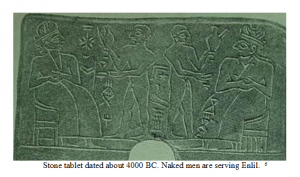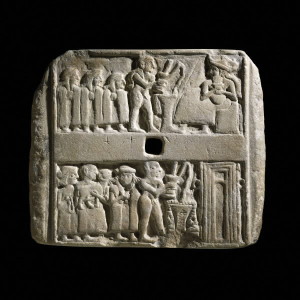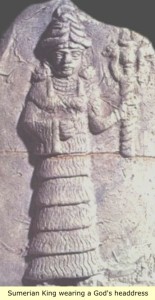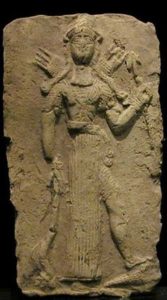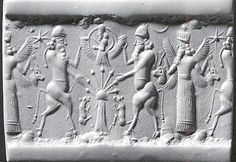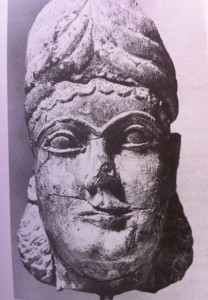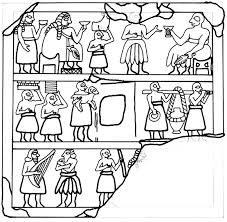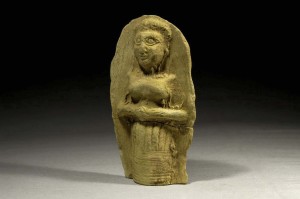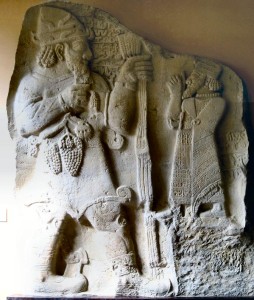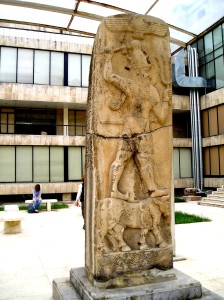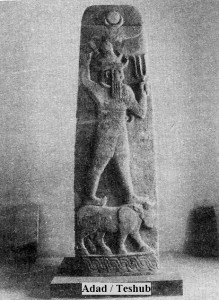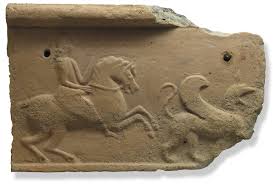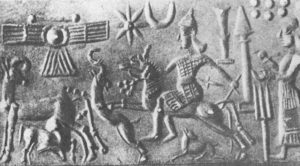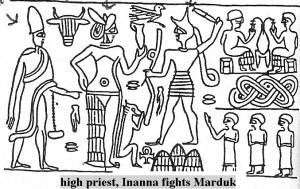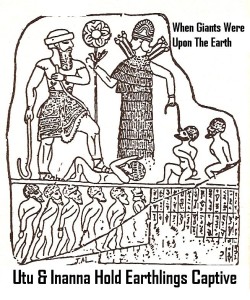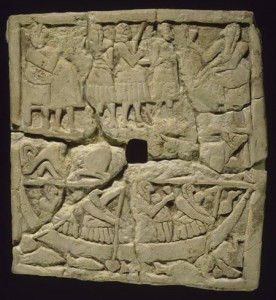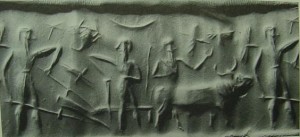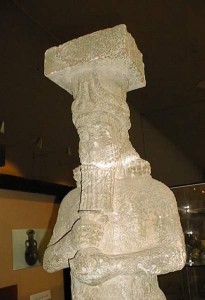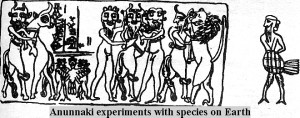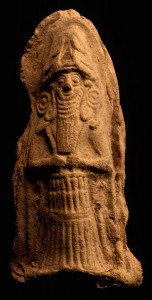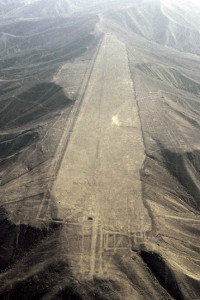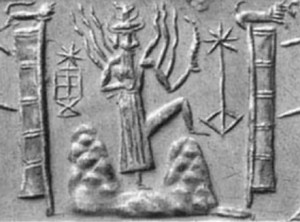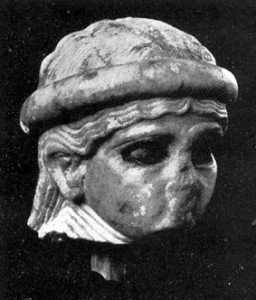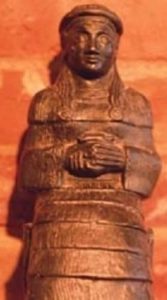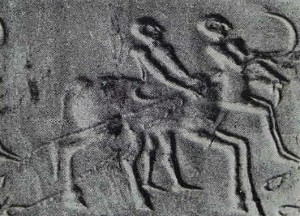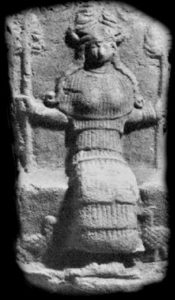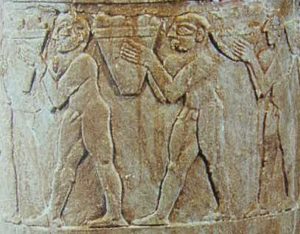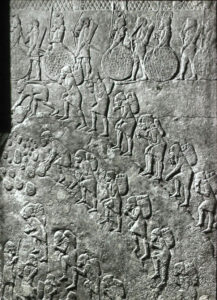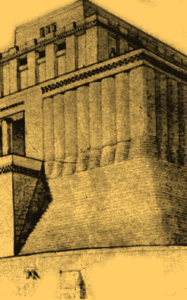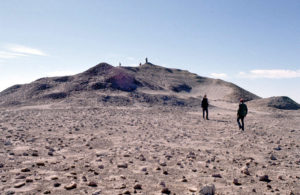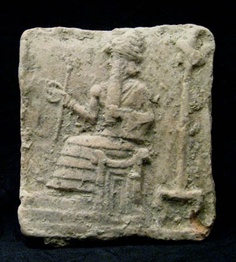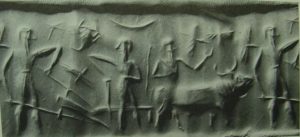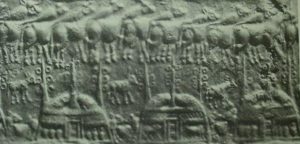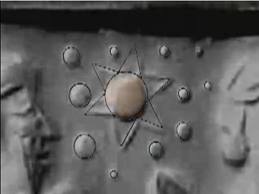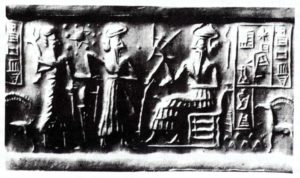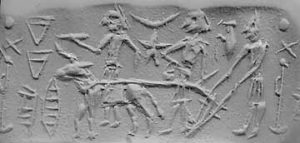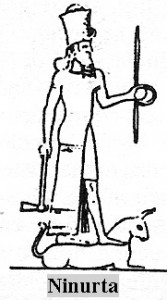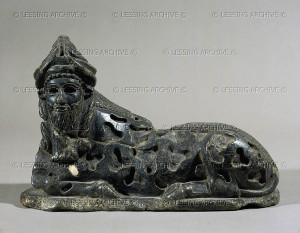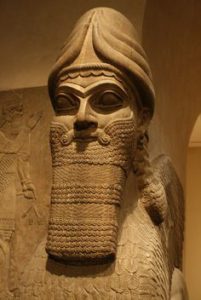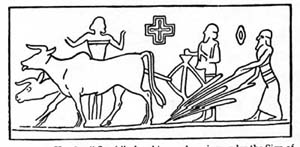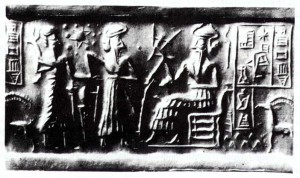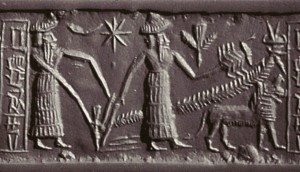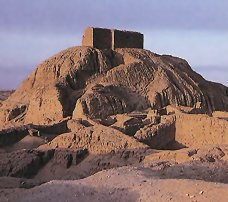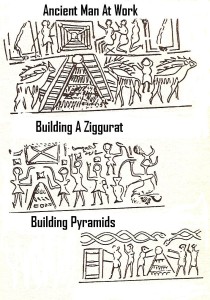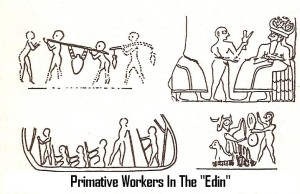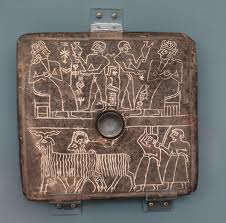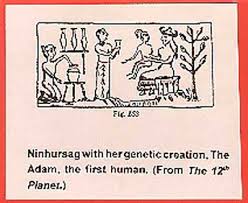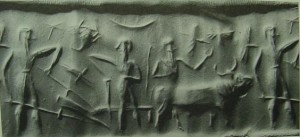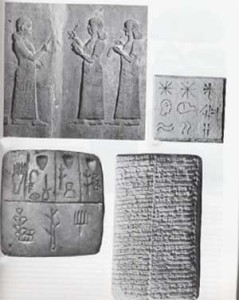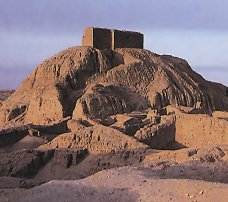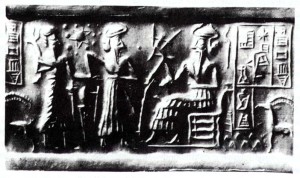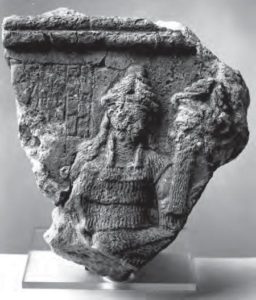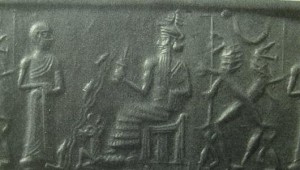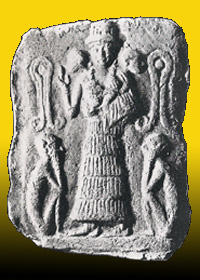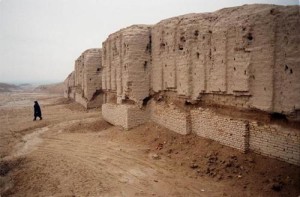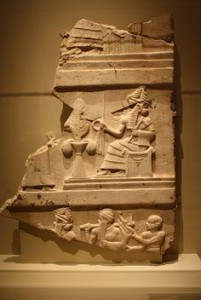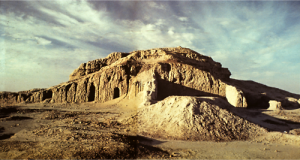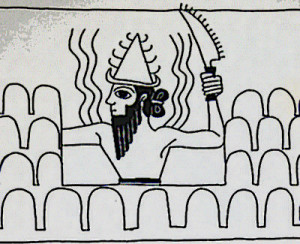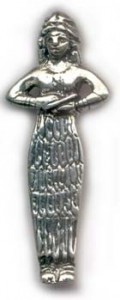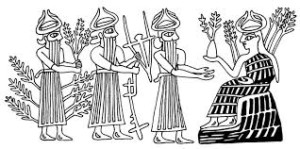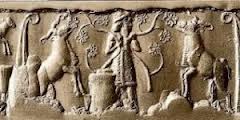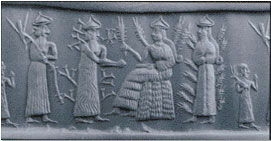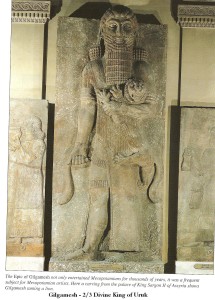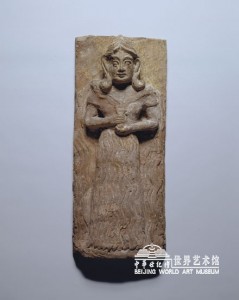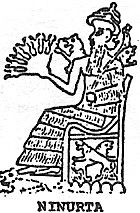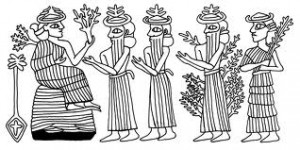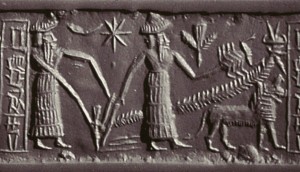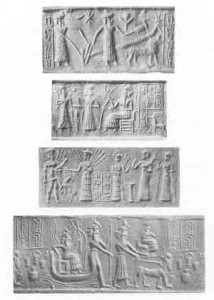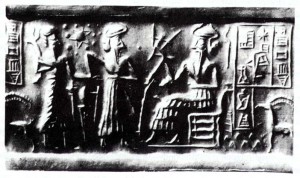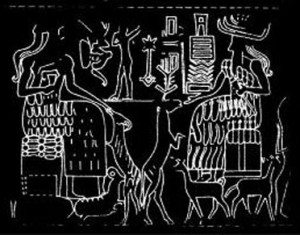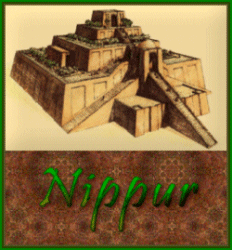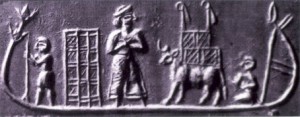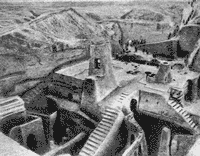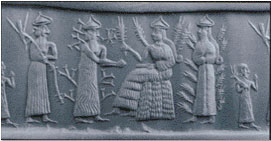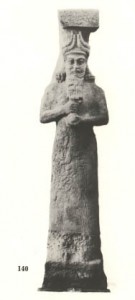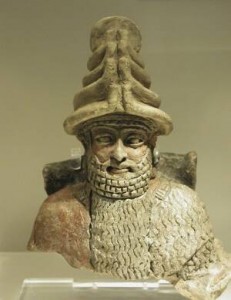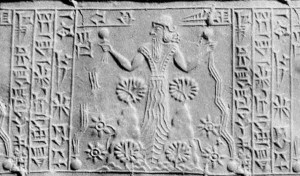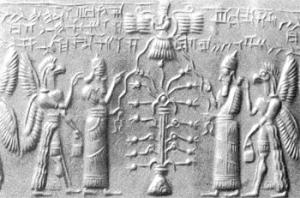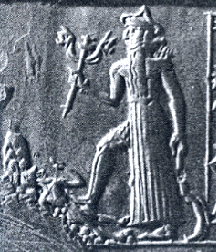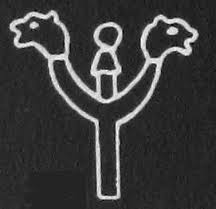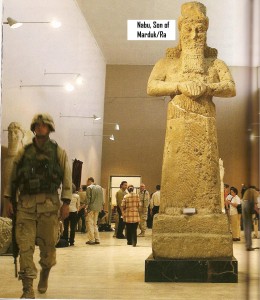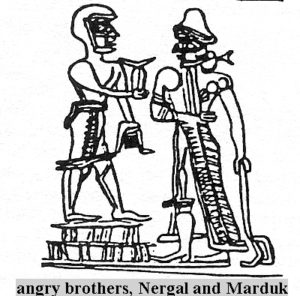The Electronic Text Corpus of Sumerian Literature
(Texts: All Artifacts, Color Coding, & Writings in Bold Type With Italics Inside Parenthesis, are Added by Editor R. Brown, not the Authors, Translators, or Publishers!)
(gods in blue …mixed-breed demigods in teal…)
SEGMENT A
unknown no. of lines missing
1-20 5 lines fragmentary
(Silver (?) speaks:) “Powerful with huge arms, does he have any rival?
He walks carrying the precious hammer stone and anvil stone.
He can create …… and thus make it larger — ……, a brother, is your right arm; ……, a mother (?), is your left (?).
He has created ……; let him show it off.
Constantly digging ……, let him accumulate goods.
After exalted …… conceived (?) him, after …… like a breast,
after …… towards the abzu, …… to the edge of the horizon, may …… bring …… for you.
After …… made …….”
2 lines fragmentary
31 lines missing
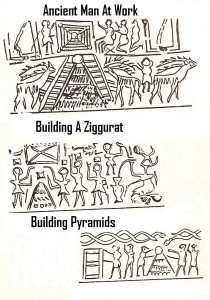 (Anunnaki aliens came to Earth to mine & colonize / claim the planet’s resources)
(Anunnaki aliens came to Earth to mine & colonize / claim the planet’s resources)
52-72 (Copper speaks:) “Mounds and wells …….
My harrow …….
Leveling all the mounds ……,
Strong Copper directs (?) the way.
A dragon ……. Strong Copper …… the fields.
Turbulent waters …… ewes.
Strong Copper …… the mighty waters.
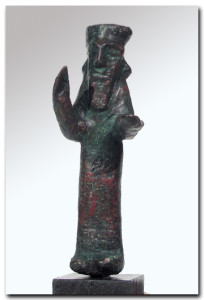 (Enlil in the “Eden”, Earth Colony Commander, King Anu‘s son & heir)
(Enlil in the “Eden”, Earth Colony Commander, King Anu‘s son & heir)
“ Enlil …….
1 line fragmentary
Silver …… Strong Copper ……
10 lines fragmentary
8 lines missing
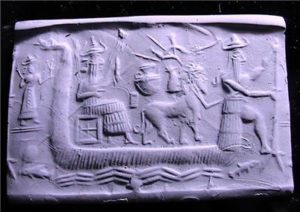 (Ninlil on shore, Enlil, & Nusku)
(Ninlil on shore, Enlil, & Nusku)
81-90 Enlil …… called for his minister Nuska: “My minister, Nuska!”
(Nuska answered:) “Always at your service!”
(Enlil replied:) “Strong Copper …… the throne and serves — let him sit in his …….”
He had barely finished speaking thus to him,
when Nuska and the minister’s retinue went together to …… and said to Strong Copper “Come in!”
Then Strong Copper clasped against his chest the labors of his huge arms,
the abundance of heaven and earth, as an offering and a gift.
91-98 But Silver too held against his chest the goats, bulls and sheep he had slaughtered.
Not planting trees in the ……,
Silver …… silver in silver pieces …….
After him, he …… his famous ……, very good things, to Strong Copper on his neck.
Silver …… an old reed box.
He put …… inside it.
Silver …… silver in small pieces …….
99-128 Against Strong Copper, the strong heir of Father Enlil, he hurled vile insults, and cast vile curses:
“The porters with their arms tied to their work; the potter, digging the hoe in the ground,
for days on end extracting the clay with his hands;
the …… worker from daybreak in a pit unfit for washing or bathing;
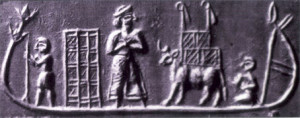 (gold mined in SO Africa shipped to Sumer for smelting)
(gold mined in SO Africa shipped to Sumer for smelting)
the shipbuilder, caulking a boat, heating up fish oil, with garments not easy to clean;
the cook, heating up oil, carrying …… water, standing by like a witness;
the brewer, who does not untie his belt in warm weather, whose hands do not dry the clay;
the maltster, never resting in winter, ……; the nest hunter, (?) spreading the nets, working in hollows;
the barber, cutting the growth, removing the flourishing roots; the freight wagon oxen shaking their heads;
the donkeys submitting their necks to the yoke, ……, carrying firewood; …….”
7 lines fragmentary
7 lines missing
The oven …… warm food.
2 lines fragmentary
unknown no. of lines missing
SEGMENT B
1-14 9 lines fragmentary
(Silver speaks:) “…… one who neither …… foundations nor erects reed fences.
Get out! You wander about …….
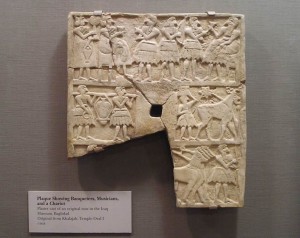 (from farming to feasting in the “Eden”, land of the gods)
(from farming to feasting in the “Eden”, land of the gods)
But my assigned task is in houses, in …… and at banquets.”
Silver did not …… in the …… which he had …….
He spoke this way in the matter of the …… strength.
15-18 Then Strong Copper, the warrior of heaven (?), kept his body firm, and did not take ……;
he did not show hate, but kept quiet (?).
He kept his neck firm, and did not …….
He …… his rejoicing face to the gods.
19-27 Strong Copper …… and addressed the Anuna (Anunnaki alien) gods:
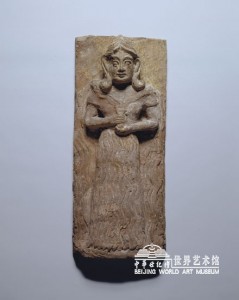 (Ninurta‘s daughter Ninsun, mother to gods & many mixed-breed son-kings)
(Ninurta‘s daughter Ninsun, mother to gods & many mixed-breed son-kings)
“Ninsumun (Ninsun, Enlil‘s granddaughter), the woman of all the destinies, …… generously.
The speech ……, …… wisdom, forgetting (?) ……, ……, pulling it out like a root, ……,
…… my counsellor ……, …… the house’s fire before Enlil, I will …… warm water …….
28-34 Strong Copper answered Silver:
“Silver, to make lead shine (?) is not an important achievement.
Restitution (?) according to the tablets does not do the work of Copper.
A hand without a wrist cannot (?) work.
A weak neck carries nothing, does not …… a thing to a load.
A heart ……, mankind …….
No one …… a boat with bitumen …… in the river.”
unknown no. of lines missing
SEGMENT C
1-12 (Copper speaks:)
” 1 line fragmentary
…… the oil jar, …… trap that ties someone up, …… all full of lies, …… his hand bringing taxes,
…… erasing restitutions (?), …… people are deceived.
A …… organized by you goes to the desert, …….
No one should put in a dwelling a …… by you.
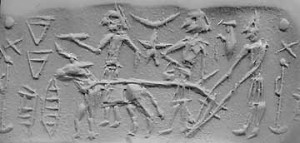 (earthlings taught to farm for the gods)
(earthlings taught to farm for the gods)
A …… by you should not make grain grow with the labours of the soil.
It should not fill the silos with grain, it makes no one rejoice.
It should not fill the hairy sacks with grain.
13-21 “No king should ride on a barge built by you.
No one should carry things from afar on a trip in a chariot of yours.
In the palace, no one should place on a table your edible …….
No young man of …… should be pleased by …… your soil (?).
No …… of assorted woods or fine oils from you should stand on the streets.
You should not work with wood, you should not work with reeds!”
3 lines fragmentary
unknown no. of lines missing
SEGMENT D
1-5 (Copper speaks:) “…… the heavens were separated from the earth, there was no drinking water …….
In order that the people should eat food ……, my father Enlil created me in a single day,
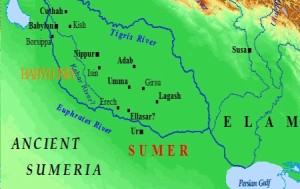 (cities of the Anunnaki giant alien gods, the 1st on Earth Colony)
(cities of the Anunnaki giant alien gods, the 1st on Earth Colony)
and then the Tigris charged like a great wild bull.
6-11 “At that time, your feet did not move, and you did not walk around.
In the …… of Enlil, not separated from the ……, you got up, and you moved your feet toward his house.
They cut you to pieces with the strength provided by me.
Someone opens …… there with the abundance I give to the population.
12-17 “Silver, consider the palace!
…… finds the time right, according to the turning starry sky, (and says:) “Come on!
You will perform the work of your arms, you will help Enlil.”
But you stick out a long tongue like a kid to a goat so that everybody can see.
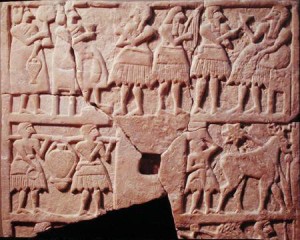 (working & feasting in the “Eden”, land between the rivers)
(working & feasting in the “Eden”, land between the rivers)
Indoors, the palace is your station and banquets are your assigned task (you say).
— Silver, I will demonstrate to you that the palace is neither your station nor your dwelling.
18-23 “Men caulk tiny, very strong boxes for you, as they do a boat.
They cover you over with their oldest rags,
and someone digs a hole for you in the middle of the cattle-pen.
Or they pour clay on top of you, as on a jar with a sealed mouth, and then,
in the darkest place inside the house, someone buries you in the most obscure corner of a grave.
24-37 “When the time of wet ground has arrived for me,
you do not supply the copper hoes that chop weeds, so no one concerns themselves with you.
When sowing time has arrived for me, you do not supply the copper adzes that make plows,
so no one concerns themselves with you.
When winter time has arrived for me, you do not supply the copper axes that chop firewood,
so no one concerns themselves with you.
When harvest time has arrived for me, you do not supply the copper sickles that reap grain,
so no one concerns themselves with you.
For your harvest or winter, you do not supply the copper adzes and chisels which build houses,
not even a female lamb, so no one concerns themselves with you.
38-46 “Silver, you are forgotten in the soil inside the house.
A scared mouse in a silent house, …… —
Silver, the palace is not your station!
An obscure place, a grave, such is your station.
Silver, banquets are not your assigned task — fasting is your assigned task.
Silver, to make lead shine (?) is not an important achievement.
The task of making divine statues is not likely to fall within your capabilities.
Why do you keep attacking me like a dog?
You snake, get back in the darkest part of the house and lie down in your grave!”
47-51 Strong Copper cast his legitimate insults against Silver, and was full of hate against him —
insults of a miserable dog, like water from a brackish well.
He exerted his powers against him to harass him.
And at this, Silver felt thoroughly harassed; it did not befit his dignity.
52-59 Silver answered Strong Copper:
“You do not give blades to the …… wooden hoe that breaks the …… ground.
The wooden …… tool mixes the clay (?) ……; wedges are not written by you.
The wooden shovels pile up the sheaves — match your measuring devices to the measuring stick!
Just approach the cargo boat that …… the canal banks,
just keep knocking on the great door of the house at night!
The stonecutter wrestles with stones and with beads —
they are too hard and he has to stop because of you.
Work away with your tines at the dirt by the oven instead!
60-66 “You have accumulated lies about my honorable station.
Let me, the mouse, do his work — his assigned task in the ground is noble.
Your teeth dig the ground, your tongue (?) moves the dirt.
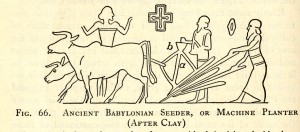 (knowledge taught earthlings by the alien gods)
(knowledge taught earthlings by the alien gods)
The copper hoe has its digging taken over by the wooden hoe in the harder ground.
The copper sickles need to have the hard weeds burned.
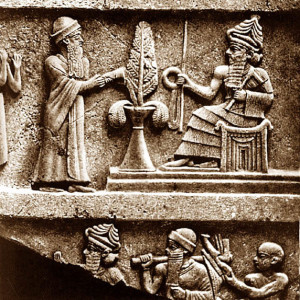 (Ninsun‘s mixed-breed son-king Ur-Nammu & Nannar, below Ninurta leads Ur-Nammu to repair Enlil‘s temple / residence)
(Ninsun‘s mixed-breed son-king Ur-Nammu & Nannar, below Ninurta leads Ur-Nammu to repair Enlil‘s temple / residence)
The copper axes which chop trees, stripping and pulling out tamarisks and ash shrubs,
have their blades dulled.
The copper saws have to lie down for a rest beside the mountain trees.
67-84 “When you keep hitting the soil, like someone falling from a roof;
when they carry (?) you out from the big brambles and …… thorns,
like a dog with a ……, as if they were catching a thief at midnight;
when the great, turbulent waters, regularly, yearly (?), fill the desert;
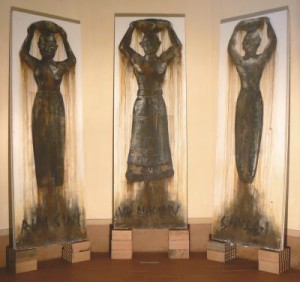 (3 different giant mixed-breed son-kings of Ninsun‘s, giant leaders of earthlings in Sumer)
(3 different giant mixed-breed son-kings of Ninsun‘s, giant leaders of earthlings in Sumer)
when they carry the grain from the dry ground to the canal banks;
when they carry the sesame from the furrows to the canal banks;
when they carry to the …… red onions, white onions, edible bulbous leeks (?)
and turnips flourishing in the furrows;
when they transport the salt and spice seeds lying at the edges of the fields;
when they feed the various grains to cattle and sheep;
when they bring …… to the pigs born at the fattener’s; when they feed dough to the porcupine’s litter;
when they crush coarse flour for the huge wild boars, straight-tailed fish,
il (?) fish, carp, fish with bellies (?), giraba fish laying their eggs in large amounts in the shallows (?),
gurgal birds, suda birds, large u birds from the middle of the sea, eggs of geese and all kinds of birds,
all the good things which thrive in the desert …….
unknown no. of lines missing
SEGMENT E
1-14 1linefragmentary
Strong Copper ……. I shall give small one-shekel pieces of silver; you should …… 3 or 4 minas.
If he turns his attention to the development of humanity, small 5- or 10-mina peces of silver ……
2 lines fragmentary
The captain …… the role of overseer.
3 lines fragmentary
small 5- or 10-mina peces of silver ……
1 line fragmentary
unknown no. of lines missing
SEGMENT F
1-10 2 lines fragmentary
of Enlil …….
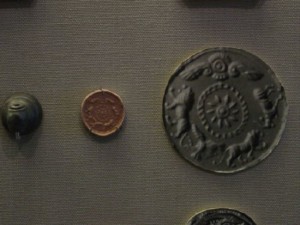 (Sumerian coins from Nannar‘s advanced city of Ur, another 1st in Sumer!)
(Sumerian coins from Nannar‘s advanced city of Ur, another 1st in Sumer!)
Small ten-shekel pieces of silver ……
6 lines fragmentary
unknown no. of lines missing
SEGMENT G
1-11 5 lines fragmentary
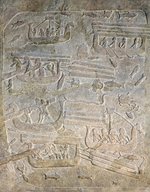 (Enlil‘s cedar timbers shipped from Lebanon to Sumer)
(Enlil‘s cedar timbers shipped from Lebanon to Sumer)
…… in aromatic oil of cedar ……. …… (all) humans, the black-headed people (unlike the gods).
Let him anoint each with my …… aromatic oil of cedar.
…… it is an abomination to my king.
1 line fragmentary
unknown no. of lines missing
SEGMENT H
1-7 4 lines fragmentary
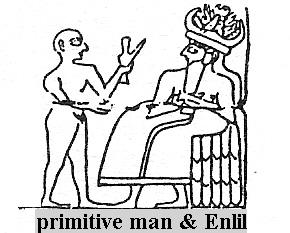 (Enlil demands that new “modern” earthlings become his workers in the “Eden”)
(Enlil demands that new “modern” earthlings become his workers in the “Eden”)
…… for my father Enlil.
2 lines fragmentary
unknown no. of lines missing
SEGMENT I
1-12 9 lines fragmentary
Silver and Strong Copper having carefully had a debate,
(E-kur, Enlil‘s temple / residence in Nippur, the alien Anunnaki‘s Earth Colony Command Central)
Strong Copper had the lead over Silver in Enlil‘s house (in Nippur) —
Father Enlil be praised!
13-29 Then the days passed, the year grew long, the silos filled up and flax was beaten …….
The year, the faraway days, …….
The heavens …… stars and lengthening shadows. …… the shadows …….
The stars of heaven …… did not …….
(astronomy & astrology began in Sumer, knowledge of the stars taught by the resident alien gods on Earth)
The records, to be found in the sacred tablets of the stars, …….
The heavens, ……, having been separated from the earth …….
8 lines fragmentary
1 line missing
30-36 Enlil joyfully addressed Sumer.
In a …… of abundance he raised …… to the duties of shepherd.
In order to build the …… of Enlil, to bring forth the houses of the great gods,
to raise the banks of the levees and ditches,
Enlil gave strength to the shepherd Ur–Namma in his majestic arms.
(Ningal Ur-Nammu Ur-Nammu Nannar)
37-44 On Ur–Namma (mixed-breed made king) receiving …… and kingship,
after he …… a good ……, Strong Copper helped him mightily.
With it, the shepherd Ur–Namma …… in great amounts.
With it, he …… the great temple of Suen (Nannar / Sin) in Urim (Ur).
With it, he …… the E–kur, the house of Enlil in Nibru (Nippur).
He made famous the houses of the great gods (literal residences of alien giants),
and raised high the banks of the levees and ditches.
45-58 Under him, his city …….
Under him, wool …….
Under him, oil …….
Under him, the people eat excellent food.
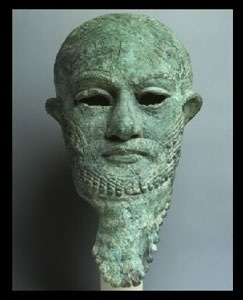 (Ur-Namma, Ninsun‘s mixed-breed son appointed to kingship)
(Ur-Namma, Ninsun‘s mixed-breed son appointed to kingship)
Strong Copper …… great …….
When raising ……, he …….
He called the one giving …… as his …… singer.
The …… of bright …….
He investigated the …… of Strong Copper.
…… their helpers.
In order to build his …….
Not neglecting …….
1 line fragmentary
unknown no. of lines missing
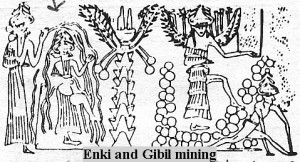
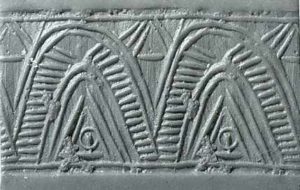
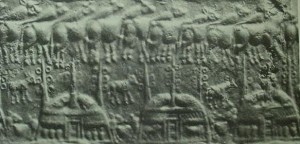
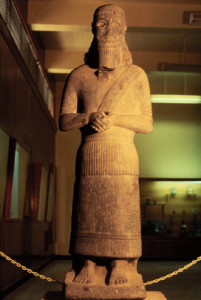
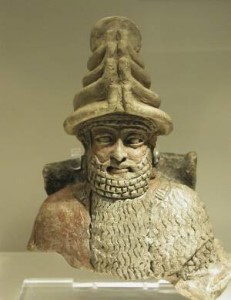
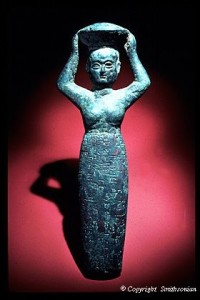
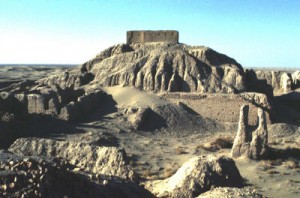
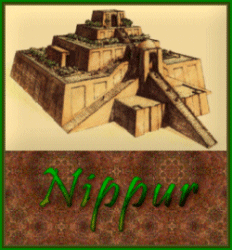
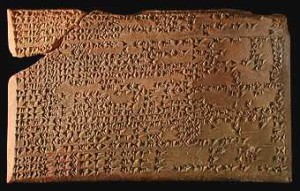
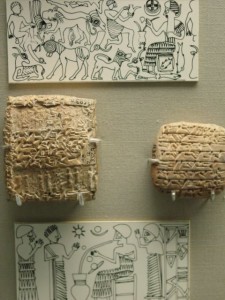
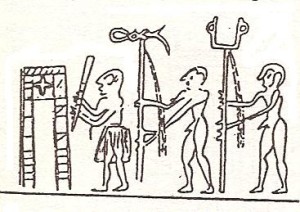
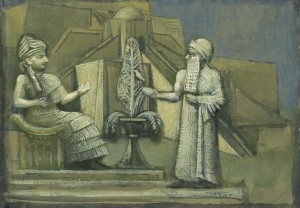

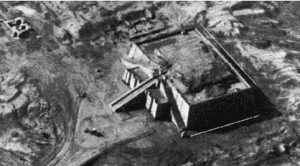
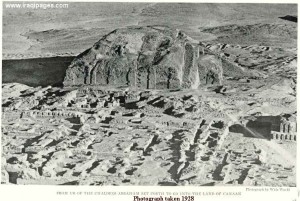
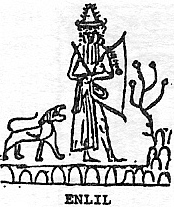
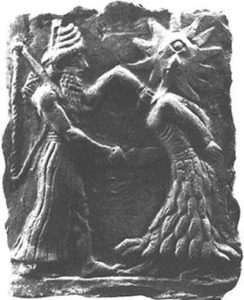
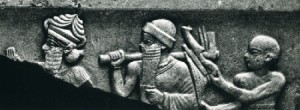
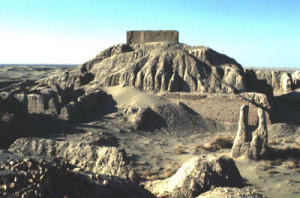
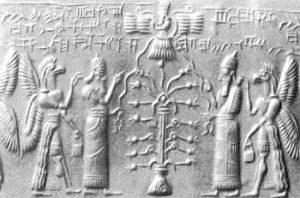
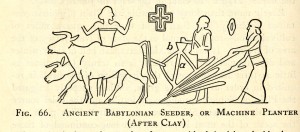
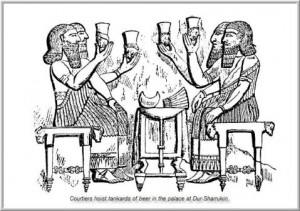
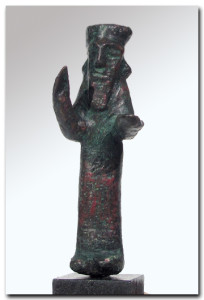
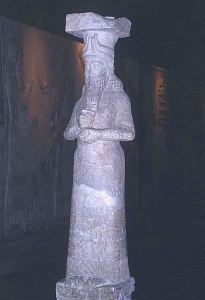
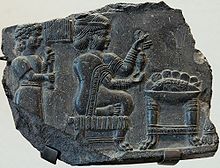
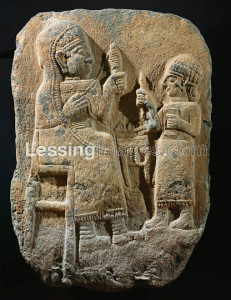
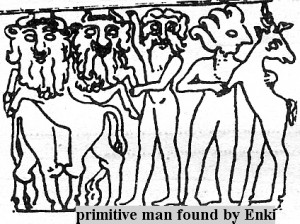
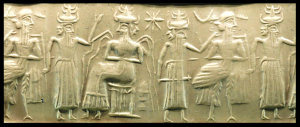
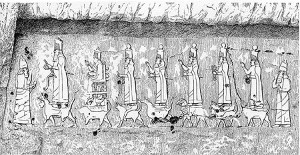
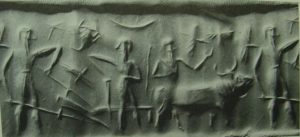 (early farming on Earth Colony)
(early farming on Earth Colony)